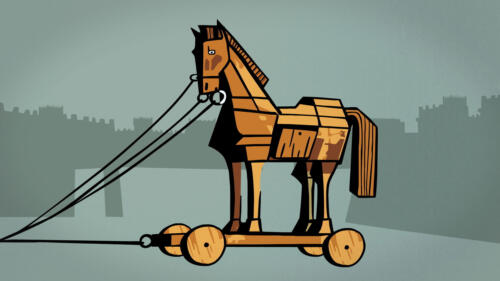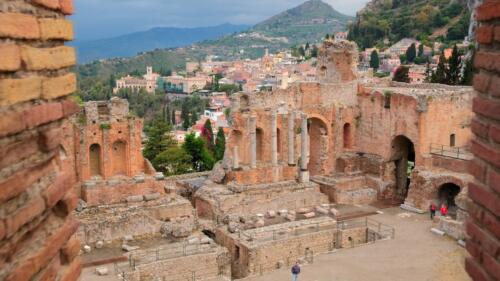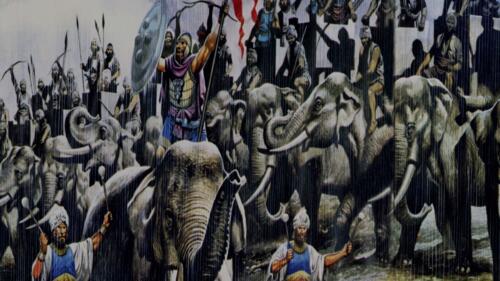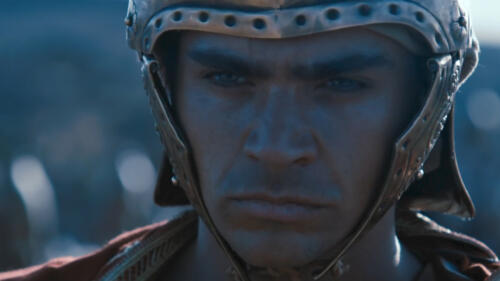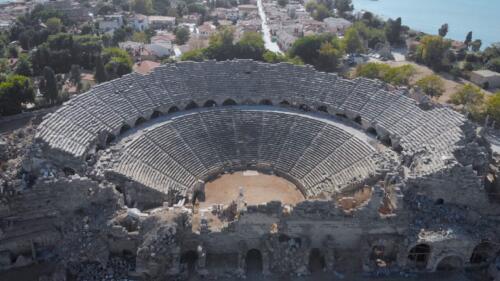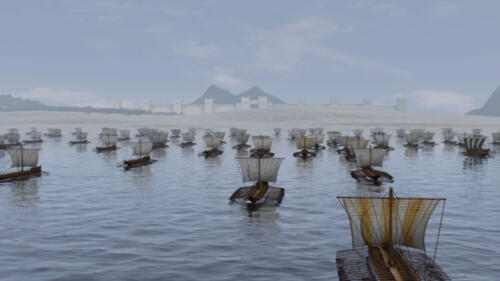Ancient Greece
Ancient Greece, the birthplace of democracy, was the source of some of the greatest literature, architecture, science and philosophy in Western civilization, and home to beautiful historical sites like the Acropolis and the Cretan palace of Knossos.
Featured Overview
Everyone knows how the Trojan War ended: with a bunch of guys piling out of a giant horse. But the events of the war itself have been debated extensively, and the actual truth is still largely unknown. All we have to go on is myth.
1:36m watch

Illustration by Eduardo Ramón Trejo. Photos from Getty Images.
Featured Overview
Everyone knows how the Trojan War ended: with a bunch of guys piling out of a giant horse. But the events of the war itself have been debated extensively, and the actual truth is still largely unknown. All we have to go on is myth.
1:36m watch
Start Here

Greek mythology, and its ancient stories of gods, goddesses, heroes and monsters, is one of the oldest and most influential groups of legends in human civilization.

In Plato's 'Republic,' the ancient Greek philosopher lays out five different forms of government, ranging from ideal to oppressive.

Athens developed a system in which every free Athenian man had a vote in the Assembly.

Here's how Alexander, one of history's most iconic military leaders, grew the ancient Greek kingdom of Macedonia and conquered the Persian Empire.
10 Amazing Ancient Olympic Facts
10 Amazing Ancient Olympic Facts
From naked athletes to foot-only races, these are 10 surprising facts you didn’t know about the ancient Olympics.
9:30 watch

3 Sports of Ancient Greece
Explore All Related Topics

The 2,100-year-old Antikythera Mechanism was pulled from a shipwreck and shocked researchers with its sophisticated astronomical and timekeeping capabilities.
While the Ancient Greeks and Romans are celebrated for their contributions to science, philosophy and architecture, they also left behind something more sinister: thousands of "curse tablets."
4:43m watch

In Homer’s epic poem, the Greek warrior encounters cyclops, sorcerers and cannibals on his 10-year journey home from war.

In Plato's 'Republic,' the ancient Greek philosopher lays out five different forms of government, ranging from ideal to oppressive.

Ancient historians describe Alexander offering prize money to those men who climbed towering cliff faces in the fastest time.

Like the Olympic Games, the Heraia race was held every four years, likely as part of a prenuptial initiation ritual.
Why did Alexander the Great fail in India? Learn more in this exclusive clip from Ancient Empires.
5:06m watch
Alexander the Great lays the foundation for Egypt in this exclusive scene from Ancient Empires.
5:42m watch
The future of Macedon is at stake. See more in this clip from Season 1, Episode 1, "Alexander the Great."
8:20m watch

Thousands of years before modern railroads appeared, the Diolkos stone road featured a section of grooved tracks and spanned across the Isthmus of Corinth.

Here's how Alexander, one of history's most iconic military leaders, grew the ancient Greek kingdom of Macedonia and conquered the Persian Empire.

Some instruments of torture, like the rack, were real. Others were likely made up to help perpetuate the myth of the medieval 'Dark Ages.'

These eight objects played a role in the daily lives of people living in the cradle of Western civilization nearly 3,000 years ago.

Ancient Greek and Roman stadiums were built to impress—and their designs are seen in many college football stadiums today.

In Athens and Rome, voting could entail shouting contests, secret stone ballots and an election system with built-in bias for the wealthy.

Ancient Greek athletes competed in individual sports that placed physical prowess on display.

The ritual grew as ownership of automobiles and then mass production of portable grills and plastic coolers soared.

Athens developed a system in which every free Athenian man had a vote in the Assembly.
From naked athletes to foot-only races, these are 10 surprising facts you didn’t know about the ancient Olympics.
9:30m watch
Everyone makes mistakes, but the people on this list made epic blunders that will never be forgotten. From Prohibition to the Trojan Horse, check out eight of the worst decisions in history.
8:38m watch

Philip II of Macedon's bodyguard—and former lover—wielded the knife. But 21-year-old Alexander, heir to the powerful king, quickly fell under suspicion.

The Greek city-state imposed brutal training and contests that began at age 7.

Alexander used both military and political cunning to finally unseat the Persian superpower.

This icon of classical architecture perched atop the Acropolis has dominated the Athens skyline for 2,500 years.

“His death may be the most famous case of pseudothanatos, or false diagnosis of death, ever recorded.”

Temples and monuments built in ancient Greece were so commanding, their ruins remain impressive thousands of years later.

Democracy in ancient Greece, introduced by the Athenian leader Cleisthenes, established voting rights for citizens, a supervising council and a jury system.

Milo of Croton reportedly ate 20 pounds of meat and drank 18 pints of wine a day to maintain his muscular physique.

Delphi was an ancient religious sanctuary dedicated to the Greek god Apollo. Said to be the center of the world, the site was also home to the Oracle of Delphi.

Mycenae is the site of an ancient city in Peloponnese, Greece. The center of a Bronze Age civilization, Mycenae also featured prominently in Greek mythology.

Macedonia is a historic region that spans northern Greece and the Balkan Peninsula and was once the center of a sprawling empire under Alexander the Great.

Symbols, amulets and other talismans from around the globe.

The Parthenon is a marble temple built atop the Acropolis in Athens during the classical age of ancient Greece. Its Elgin Marbles are now housed in the British Museum.

Ephesus, an ancient port city in modern-day Turkey, was once an important trading center in the Mediterranean region and home of the famed Temple of Artemis.

The Acropolis of Athens, Greece, a UNESCO World Heritage site, has been home to kings, religious festivals and temples like the Parthenon since the Bronze Age.
Everyone knows how the Trojan War ended: with a bunch of guys piling out of a giant horse. But the events of the war itself have been debated extensively, and the actual truth is still largely unknown. All we have to go on is myth.
1:36m watch
Get an overview of the ancient leaders who oversaw the expansion and growth of civilizations around the world.
3:23m watch

Archaeologists working on the famed Terra Cotta Army in China believe their lifelike appearance could have been modeled on ancient Greek sculptures.

These pioneering writers authored some of the earliest works of history.

Music is likely as old as humanity. But when was the first song recorded in history?

Much like at Pompeii, archaeologists uncovering the ancient Greek city of Selinunte have found a once-thriving metropolis frozen in time.

One of the most famous examples of ancient Greek sculpture, the Venus de Milo is immediately recognizable by its missing arms and popularly believed to represent Aphrodite, the Greek goddess of love and beauty, who was known to the Romans as Venus. The artwork was discovered in 1820 on the Aegean island of Melos (also […]

From medieval knights to Japanese kamikaze pilots, soldiers throughout history have yelled out intimidating and inspiring rallying cries.

The term democracy, which means “rule by the people,” was coined by the Greeks of ancient Athens to describe their city-state’s system of self-rule, which reached its golden age around 430 B.C. under the skilled orator and politician Pericles. It is probable that the Athenians were not the first group of people to adopt such […]

It has to do with ancient Greek mythology, the Olympics and the British royal family.

It's not always possible to separate fact and fiction about the famed ancient Macedonian ruler, but here are eight great takeaways from Alexander’s life.

From Britain’s most beloved outlaw to the founder of Sparta, find out more about six historical figures whose existence remains up for debate.

An Oxford researcher says she has found evidence of the elusive Hanging Gardens of Babylon—300 miles from Babylon.

From fitness tests for infants to state-sponsored hazing, find out why these ancient Greek warriors had a rough go of it.

Although shrouded in myth, the ancient Olympics were surprisingly similar to the modern Olympic Games.

Greek archaeologists report that budget cuts have placed the country’s cultural heritage at risk.

The warrior Achilles is one of the great heroes of Greek mythology. According to legend, Achilles was extraordinarily strong, courageous and loyal, but he had one vulnerability–his “Achilles heel.” Homer’s epic poem the Iliad tells the story of his adventures during the last year of the Trojan War.

Hercules was a hero of Greek and Roman mythology. He succeeds at completing 12 labors of incredible difficulty, securing his eternal immortality with the gods.

Ancient Greek art flourished around 450 B.C., when Athenian general Pericles used public money to support the city-state’s artists and thinkers. Pericles paid artisans to build temples and other public buildings in the city of Athens.

Ancient Greece, the birthplace of democracy, was the source of some of the greatest literature, architecture, science and philosophy in Western civilization, and home to stunning historical sites like the Acropolis and the Parthenon.

Herodotus was a Greek writer credited with being the first historian. Sometime around 425 B.C., he published The Histories, an inquiry into the Greco-Persian Wars.

The Hellenistic period lasted from 323 B.C. until 31 B.C. Alexander the Great built an empire that stretched from Greece all the way to India, and his campaign changed the world: It spread Greek ideas and culture from the Eastern Mediterranean to Asia.

Classical Greece, a period between the Persian Wars and the death of Alexander the Great, was marked by conflict as well as political and cultural achievements.

Watch a brief video summarizing the Trojan War, the conflict recounted in Greek mythology between the kingdoms of Troy and Mycenaean Greece.

Leonidas (c. 530-480 B.C.) was a king of the city-state of Sparta from about 490 B.C. until his death at the Battle of Thermopylae against the Persian army in 480 B.C. Although Leonidas lost the battle, his death at Thermopylae was seen as a heroic sacrifice because he sent most of his army away when he realized that the Persians had outmaneuvered him. Three hundred of his fellow Spartans stayed with him to fight to the end and die.

Greek mythology, and its ancient stories of gods, goddesses, heroes and monsters, is one of the oldest and most influential groups of legends in human civilization.

Sparta was a military city-state in ancient Greece that achieved regional power after Spartan warriors won the Peloponnesian War against the rival city of Athens.

One of the greatest ancient historians, Thucydides (c.460 B.C.–c.400 B.C.) chronicled nearly 30 years of war and tension between Athens and Sparta. His “History of the Peloponnesian War” was a defining text of the historical genre. Unlike his near-contemporary Herodotus, Thucydides’ topic was his own time.

Socrates is one of the most exemplary and strangest of Greek philosophers who helped pave the way for other prominent thinkers including Plato and Aristotle.

The Athenian philosopher Plato (c.428-347 B.C.) is one of the most important figures of the Ancient Greek world and the entire history of Western thought. In his written dialogues he conveyed and expanded on the ideas and techniques of his teacher Socrates.

Pericles was a 5th century B.C. Athenian general and statesman who raised the grand structures of the Acropolis and turned his city's alliances into an empire.

Alexander the Great was an ancient Macedonian ruler and one of history’s greatest military minds who before his death established a powerful, immense empire.

Aristotle (384-322 B.C.) was a Greek philosopher who made significant and lasting contributions to nearly every aspect of human knowledge, from logic to biology to ethics and aesthetics.

The Peloponnesian War (431–404 BC) was fought for nearly a half-century between Athens and Sparta, ancient Greece’s leading city-states.

The Battle of Marathon in northeastern Attica is one of history's earliest recorded battles. The fighting in 490 B.C. marked the first blows of the Greco-Persian War. The victory of “the Marathon men” captured the collective imagination of the Greeks, with the tale of the messenger running 25 miles to Athens to deliver the news fueling the creation of the modern marathon.
